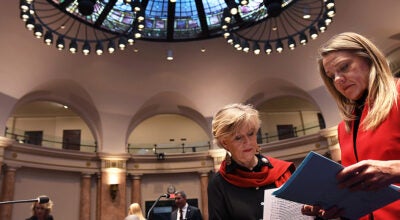Governor vetoes series of bills
Published 2:22 pm Tuesday, April 9, 2024

- Kentucky Governor Andy Beshear reacts to a question sits for his first interview following his re-election in the Kentucky Governors race in the State Reception Room at the Kentucky State Capitol Frankfort, Ky., Wednesday, Nov. 8, 2023. Beshear defeated Attorney General Daniel Cameron to retain the Governorship. (AP Photo/Timothy D. Easley)
FRANKFORT — Gov. Andy Beshear had until midnight Tuesday to sign or veto bills on his desk.
Those he vetoed will return to the General Assembly to address Friday or Monday. Bills that Beshear neither signed nor vetoed will become law without his signature.
What did Beshear veto or let become law before his final day?
Vetoed bills
Just as he did last year, Beshear vetoed a bill that would establish a regulatory framework for autonomous vehicles on Kentucky’s public highways.
However, the legislature didn’t pass the self-driving car measure until after the veto period last year, so it had no chance to override Beshear. This time may be different.
House Bill 7 narrowly passed the Senate in a 20-18 vote, so its fate is not certain. In his veto message, Beshear shared concerns about the “safety and security” of autonomous vehicles.
Beshear objected to the lack of a testing period requiring human drivers behind the wheel.
The governor also vetoed House Bill 513, which would require the General Assembly’s approval to install or remove statues or other permanent art from the Capitol Rotunda.
Currently, that power rests in the Historic Properties Advisory Commission. In 2020, the commission voted to remove a statue of notorious Confederacy president Jefferson Davis, who was born in Kentucky.
Beshear cited the removal of the Davis statue as an example of what the commission wouldn’t be able to do without the legislature’s approval if HB513 became law. He added that the bill generally encroaches on the executive branch’s authority over the property it owns.
Another vetoed bill is House Bill 44, which deals with several election-related topics. The measure would require circuit clerks to report anyone removed from jury duty for not being a U.S. citizen, and then have the State Board of Elections remove them from the voter rolls.
It would also require the Secretary of State and the State Board to annually report on voter roll cleanup. The board of elections would post its report of how many voters are registered at each address online, allowing citizens to report anomalies.
It bans ranked-choice voting, a process by which voters rank their choice of candidates instead of choosing just one in races with more than two options.
If none of the candidates receives at least 50% of the vote, the candidate with the least number of top voter picks would be removed from the race. Voters who chose the losing candidate as their top pick would have their second pick move into the No. 1 spot. Then, the race would be re-tabulated in this manner until a candidate earns an absolute majority.
Finally, the Cabinet for Health and Family Services would be charged with providing a copy of “lifetime Kentucky death records” to the state board annually.
Beshear zeroed in on this section in his veto message. He wrote that lifetime death records is not a real term and that the Cabinet already provides monthly death records, deeming HB44 “not necessary.”
He did not mention the other aspects of the bill in his message.
Beshear vetoed several bills directly or indirectly targeting Louisville entities.
House Concurrent Resolution 81 would establish a task force to review the efficiency and effectiveness of Jefferson County Public Schools’ governance model in light of “unacceptable” academic proficiency.
It would compare JCPS’ governance to districts of similar sizes and demographics in other states, as well as explore the impacts of restructuring on things like funding, performance and accountability.
Beshear called HCR81 “unconstitutional special legislation” that sets the framework for the legislature to divide JCPS. He said that should be a local decision.
House Bill 136 would prevent Louisville’s air pollution authority from issuing fines against industries that self-disclose violations of federal pollution regulations and fix the issue. Beshear wrote that the bill was “another attack…on Jefferson County” and an attempt to remove local control.
Jefferson County is the only county whose air pollution is not regulated by the state’s energy and environment cabinet.
Lastly, Beshear vetoed House Bill 388, which includes a provision making Louisville’s mayoral and Metro Council elections nonpartisan. He said it also removed local control over how the city is run.
Bills that became law without the governor’s signature
Beshear chose not to sign or veto several bills. When this happens, the bill becomes law without a governor signature after ten days.
While Beshear did not explain his inaction, there are a few common reasons why governors do so.
Sometimes it’s a political move—a governor may not want to expressly show their support or opposition to a bill that may hurt their popularity or future electability. Beshear is term-limited, so this is less likely.
Another reason is to avoid the futility of vetoing a bill that a governor knows will be easily overridden.
Beshear allowed Senate Bill 215 to become law. It bans the Transportation Cabinet and other political entities from adopting emissions standards on new motor vehicles. It also bans them from requiring the purchase or sale of electric vehicles.
While Beshear supports the electric vehicle industry, he’s stated previously that he agrees with the majority Republican legislature that the federal government’s timeline is aggressive.
Another bill passed without Beshear’s signature is Senate Bill 53, which requires the attorney general to conduct hand-to-eye recounts of at least one ballot scanner and race tabulated on it in every county.
Finally, Beshear neither signed nor vetoed House Bill 825, which requires a performance audit of the Kentucky Department of Education. The audit will study the department’s effectiveness and efficiency, as well as identify any projects or initiatives that do not improve educational outcomes.




